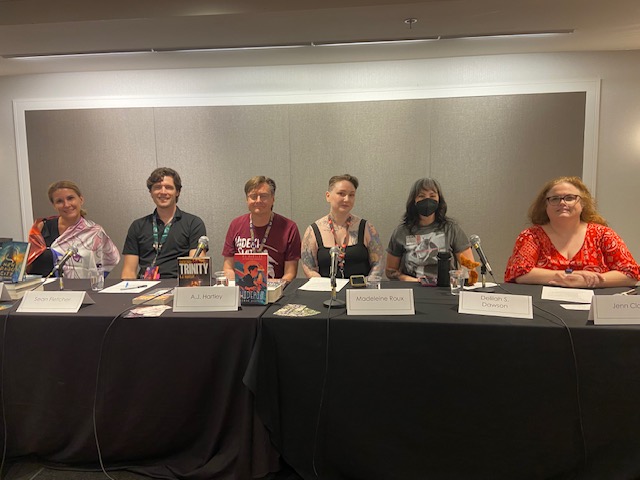The “Stuck in the Middle (Grade)” panel dove into the benefits and complications of publishing in the middle grade, from writing stories that appeal to young teens to getting them to put down their devices and read a book. The panel took place on the YA Lit track at 4PM on Saturday, August 31 in the Marriott, Room A707. Jenn Clack served as moderator with speakers Mari Mancusi, Sean Fletcher, AJ Hartley, Madeleine Roux, and Delilah S. Dawson.

The moderator began the panel by asking the authors what motivated them to write middle grade fiction. Hartley started off writing adult mystery thrillers. He went on ride-alongs with police and one night came home and told his wife he couldn’t do it anymore. He didn’t like seeing all the darkness.
His wife asked him what he was going to do instead. At the time his son was seven years old and Hartley decided to write for his son. He wrote middle grade until his son was too old for that then he turned to YA.
For Mancusi, in 2005 YA was very popular, and she had a young authorial voice, so her agent suggested she try YA. Later, as the YA genre matured and became darker, and she still had a young voice, her agent recommended she switch to middle grade. She’s written several successful books in middle grade, including New Dragon City.
Roux was a successful author when she was contacted about writing Dungeons & Dragons novels. She thought she would be writing adult stories, but she wound up getting asked to write middle grade books with monsters. At first, she was hesitant to do so, but after seeing the artwork of the illustrator they’d lined up to work with her, she was sold on the project.
It also grew on her because as a child she loved to read D&D books. Her older brothers read them and she wanted to be like them. As an adult, she wanted to write D&D books with a female protagonist other girls could identify with, as well as add in a lot of diverse monsters to make the books welcoming to a wide range of teens.
Hartley added to that by noting he grew up in a happy home, but he was a misfit in his neighborhood. He was also a misfit when he went to university. His son is mixed race, and middle grade deals heavily with characters who feel they don’t belong.
The moderator then asked the authors what part of their real lives they bring into their stories. For Dawson, as a child her dad didn’t like her. She wrote a book where a child has to deal with that trauma, and at the end of the story that character received healing.
In discussions of the benefits of writing in middle grade, Roux noted that kids should have books that are fun, adventurous, and exciting to read. Hartley picked up on that asking if people remembered when life was fun, instead of burdened with all the concerns of adulthood. He noted that it’s appealing to write stories that are fun and adventurous for kids and offer them a safe space.
Dawson finds middle grade appealing because she finds a lot more openness and freedom in middle grade. As Hartley noted, adults may have thirty different things weighing them down in their lives. YA has certain issues and problems that authors are expected to handle in their stories. Middle grade, kids have two to three issues they’re concerned with at a given time. Those things weigh heavily upon them, but there’s less complexity to handle in the novel. The rest of the time can be devoted to fun and adventure.
Near the end of the panel, the moderator asked the authors about trends from librarians to get kids back into physical books to reduce their screen time.
Mancusi noted that for books at all levels, readers are moving back into physical copies instead of digital. Formats are also changing, as Barnes & Noble wants only paperbacks on their shelves instead of hardbacks, because it’s cheaper for teens, children, and the parents buying for them. It’s forcing the publishers to completely change how they publish, which had historically been hardback for a year, then successful books received paperback editions.
For Dawson, she loves the rise in audiobooks and thinks that can engage children who don’t like to read. Her son is an example. He hates to read. She wished she’d had more audiobooks to play for him in the car while he was growing up to perhaps engage him in stories. She hopes other parents are able to engage children with books through listening.
